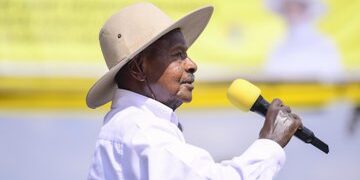President Yoweri Kaguta Museveni has underscored the critical role of wealth creation in driving Uganda’s development, urging leaders to shift focus from infrastructure projects to economic empowerment.
Speaking at Bushenyi Boma Grounds in Ishaka-Bushenyi Municipality during a meeting with leaders from the Ankole sub-region, the President highlighted the ongoing challenges faced by developing nations, including conflicts in the Democratic Republic of Congo, Sudan, and Somalia.
Understanding National Challenges
“We must first understand why these conflicts occur,” he said, likening national leadership to medical practice. “A leader, like a doctor, must diagnose problems correctly to prescribe the right solutions.”
Reflecting on Uganda’s development priorities since the 1960s, President Museveni pointed out that while infrastructure—such as roads, electricity, schools, and hospitals—was once the primary measure of progress, true transformation comes from wealth generation.
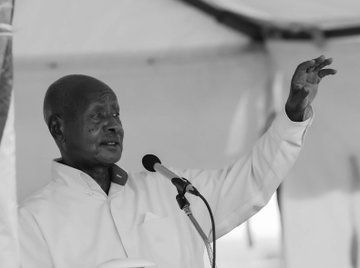
“Infrastructure is important, but wealth creation is what truly lifts people out of poverty,” he said, urging leaders to promote income-generating activities.
Personal Experiences and Success Stories
To illustrate his point, the President shared his personal journey in wealth creation, recalling how he started with cattle in Rubaya in 1968 before expanding to Rwakitura.
He also cited success stories such as Joseph Ijara of Serere, who turned 2.5 acres of land into a thriving poultry farm, and Deziranta Tumusiime and Kenneth Ayesiga, who leveraged small investments in piggery and food supply to transform their lives.
“We must embrace such grassroots success stories. Wealth creation begins with individual initiatives,” he affirmed.
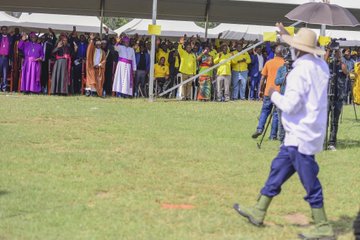
Government Programmes for Economic Growth
President Museveni highlighted several government initiatives designed to support local economic development, including Entandikwa, NAADS, Emyooga, Operation Wealth Creation, and the Parish Development Model (PDM).
“The PDM ensures funds remain within communities, allowing beneficiaries to invest in their own growth. This money won’t return to Kampala—it’s a revolving fund meant to sustain local economies,” he emphasized.
Acknowledging diverse economic needs across different parishes, the President called for tailored funding allocations to ensure equitable development.
Addressing Land Fragmentation and Agricultural Challenges
President Museveni also addressed concerns over land fragmentation, advising families to use inherited property productively rather than dividing it. He stressed the importance of proper land utilisation to maximize economic benefits.
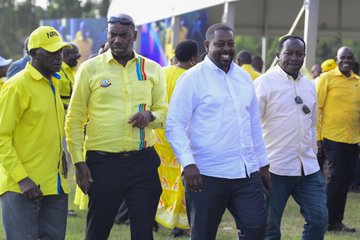
Regarding agriculture, he called for full support of a government irrigation program to combat drought-related challenges.
“This programme is vital. People living in wetlands must relocate so we can manage resources efficiently for food production and water distribution,” he said, adding that Uganda must invest in processing industries to boost agricultural value chains, including egg production, dairy products, and other agribusiness ventures.
Wealth vs. Infrastructure Development
The President noted that despite improved infrastructure, urban poverty remains a challenge.
“We cannot mistake modern infrastructure for economic empowerment. Many people in urban slums still struggle despite having roads and electricity. Wealth creation must be our priority,” he stressed.
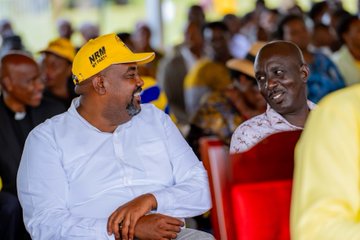
Investing in Science and Technology
Encouraging the youth to pursue careers in science and technology, President Museveni emphasised the need for more scientists, engineers, doctors, and agricultural experts.
“If we want a strong economy, we must focus on fields that generate tangible wealth. Storytellers can’t feed the nation,” he remarked.
He further urged Ugandans to rise above sectarian divisions and focus on economic sustainability, particularly in commercial agriculture, manufacturing, ICT, and services.
“Our national progress depends on prioritising wealth creation over irrelevant politics,” he concluded.
Vice President Alupo Applauds President’s Vision
Vice President H.E. Jessica Alupo lauded President Museveni’s unwavering commitment to Uganda’s transformation, noting that his leadership has significantly advanced the economy, education, and infrastructure.
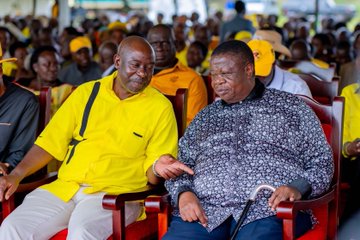
“This is a historic moment for Ankole. Your presence here today is a long-awaited homecoming that means a lot to the people,” she said.
She praised local leaders for their strong turnout, which she described as a testament to their support for the President’s vision.
Highlighting Uganda’s economic progress, Alupo stated, “Our economy has grown tenfold, Ugandans are better educated, and access to services has significantly improved. Childhood deaths from preventable diseases have reduced due to immunisation, and infrastructure expansion has reached every corner of the country.”
She referenced the President’s recent regional tours, including visits to Bukedi, Teso, Sebei, Karamoja, Busoga, Lango, Greater Masaka, and Kigezi, as platforms that have provided firsthand testimonies of government achievements.
“With 33% of Ugandans still outside the money economy, we must work toward inclusive economic growth,” she noted.
Parliamentarians Present Key Development Requests
Hon. Basil Bataringaya Rwankwene, Member of Parliament for Kashari North, presented a memorandum on behalf of Ankole sub-region leaders, expressing gratitude for the President’s commitment to development.
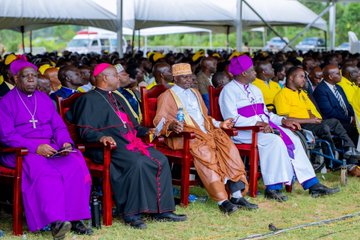
He commended the government’s introduction of Universal Primary and Secondary Education, industrial hubs for youth employment, and efforts to combat diseases affecting both humans and livestock, citing the successful management of the COVID-19 pandemic.
Bataringaya also raised key infrastructure concerns, including stalled road projects such as Bwizibwera-Nyakambu, Mbarara-Kabwohe-Ishaka, Mbarara-Ibanda, Kabwohe-Kitagata, Kashwa-Kashongi, and Kashozi-Butamba-Kaliro.
“We believe that with these roads completed, we shall fully reap the benefits of economic transformation,” he said.
He further highlighted issues in electrification, noting that some electricity poles in Ankole have remained unconnected for 15 years. He also advocated for an additional Presidential Industrial Hub in Greater Bushenyi to expand job creation and skills training.
Local Leaders Appreciate Government’s Economic Focus
Hon. Annet Katusiime Mugisha, Bushenyi District Woman MP, praised the President’s economic policies.

“Thank you, President Museveni, for championing Uganda’s economic transformation,” she said.
She emphasised the success of the Banana Research Center in Bushenyi, which has boosted production and market access, even for those without cooperatives.
Top government officials, including Prime Minister Rt, attended the event. Hon. Robinah Nabbanja, NRM Secretary General Rt. Hon. Richard Todwong, Minister of State for Investment and Privatization; Hon. Evelyn Anite, Minister of State for Agriculture, Animal Industry, and Fisheries (Animal Industry;) Hon. Bright Rwamirama; and several Members of Parliament.
